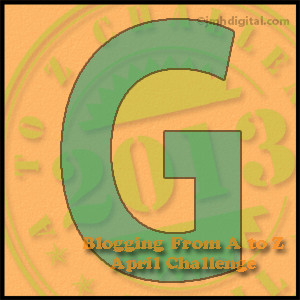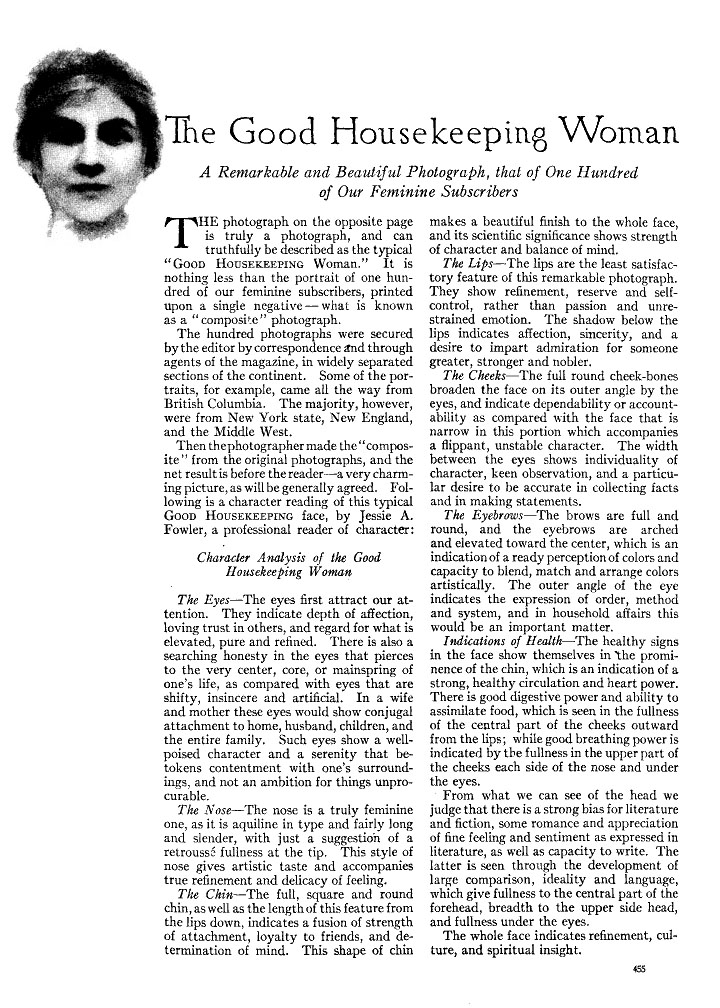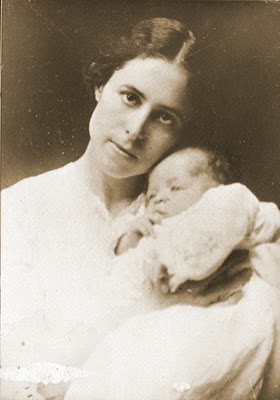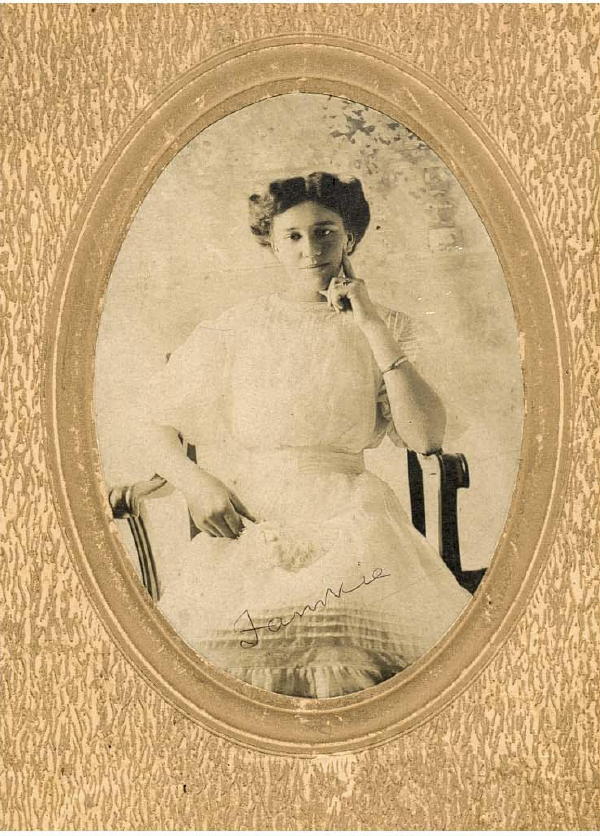This is my seventh post for the April A-Z Challenge. I am going to write about my grandmothers and Good Housekeeping magazine’s October, 1912 issue about their “Composite Reader”. I read a post over at Shery’s blog, A Hundred Years Ago, this morning. It got me thinking about my grandmothers and also wondering what the rest of the article said. I found it in the Cornell University Home Economics Archive. Some other articles in the magazine were:
- The Woman of the Future by Thomas A. Edison: About the wonders that electricity will bring to women and final enable them to be raised up to the level of the superior male mind because their housework will be negligible and actually engineering.
-
Mirandy on the Love Test by Dorothy Dix: An article written in what is supposed to be the dialect of a black woman, gives advice. I could not get through the whole article for being irritated.
- Practical Eugenics – letters responding to an earlier article which I could not find. Mostly talking about stopping the birth of “imperfect” children or to stop children from being born to “imperfect” parents.
-
The Ideal Suburban Home of the Near Future: by Sarah Louise Arnold, talks about ideas for communal apartment living that may come before moving to that ideal small house in the suburbs.
Some of these articles reminded me of a book my grandmother Fannie had called “Ideal Home Life” which was written in 1909. There were article in The Indianapolis Recorder written during that time that also talked about simplified and gracious living. Instead of eugenics, they concentrated on “uplift” and had articles about ways to teach those who didn’t know the proper way to keep house and raise children, how to do it.
What were my grandmother’s doing at this time?
Pearl Reed Cleage was born in Lebanon, KY in 1884. In October of 1912, she was 28 had been married for almost two years to Albert B. Cleage Sr. Her mother, Anna Allen Reed, died the previous year. Pearl had one son (my father) who was about 17 months old. They lived in Kalamazoo, MI where my grandfather had opened a medical practice. While they lived in Indianapolis, IN, my grandmother’s name appeared in the newspaper quite often for singing at church and civic events. I found no such articles in the Kalamazoo papers. Her growing family probably put an end to that. I hope she was still able to sing in her church choir. My Uncle Louis was born in August of 1913.
Fannie Turner Graham was born in 1888 in Hayneville, AL and was 24 years old in 1913. She moved to Montgomery with her mother and sister when she was four and was still living there in 1912 with her mother and two sisters. She was managing her Uncle Victor Tulane’s grocery store. In 1911 she was a member of the Progressive Twelve Club. They seem to gather for sewing and socialization. She attended First Congregational Church services with her family. It wouldn’t be until 1919 that she married my grandfather, Mershell Graham.




Kristin,
This is why I keep reading your posts. They are so provocative. No easy reading here. I don’t know how you have the stamina to write every day as you do — and in no way is it “fluff.” Thanks for challenging my mind on this Monday morning — as uncomfortable as it makes me to read it.
What’s most troubling, Kathy, is that I’m assuming it didn’t trouble most of the readers of Good Housekeeping magazine in 1913. Would it have kept my grandmother’s from reading Good Housekeeping? Were they even interested in it? I know later my grandmother Pearl subscribed to McCall’s. That’s where I got my paper dolls. It’s one thing to run across it during research and another when you’re just trying to read a magazine.
This post contains so much rich–though disquieting– information. I’m glad that I got you started thinking about doing this post. It’s very difficult to understand why the magazines back then chose to either ignore or use odd dialects/characterizations when portraying some segments of the population. The eugenics letters are also very troubling. The one from the woman who supported eugenics because she was an “old maid” and felt like she never should have been born was especially sad.
I thought that letter was sad too. Most of the other people writing were so self righteous and sure that they were good specimens that should reproduce. Same ideology that made many of the people in charge of the media either ignore or show races other than white as buffoons, which just perpetuated the ignorance in their readers and listeners.
I am glad I found you via AtoZ today because our topics are similar. I am doing an entire series on “Literary Grannies” in some part to raise awareness of Women Writers in the Literary Canon.
I also love vintage magazines, newspapers, etc and create art from them. Just today I was lecturing myself about actually getting to work on my magazines from the 20’s and one from 1904. I think by making art from these works and then hanging them (and selling them) I am doing my contribution to keeping history alive… and appreciated.
Also – troubling about Dorothy Dix writing such a “story” – ouch. Ouch. Ouch again. The thing is, they probably hadn’t evolved enough to know what poor taste this was for her to do.
I am so glad I found you today!
I thought it was pretty troubling too. You never know when these types of things will jump out and take you by surprise when you are reading old stuff. When I least expect it, there it is. Always disconcerting.
I’m glad you found me too and now I’ll have to go visit your historic grannies.
I commented on my blog, Kristin, and I wanted you to be sure I completely agree with you on Zora Neale Hurston’s seeking “equality” in education rather than requiring an “integrated” education. I also recently read an essay written in 1975 by Alice Walker. It was about how she went “in search of” Zora and even purchased a headstone for her, since she didn’t have one when she died. Alice Walker rallied for Zora Neale Hurston to be recognized for the brilliant writer she was and her work has been brought back – I was even a part of a reading of “Their Eyes Were Watching God” when it was a selection of “One Book One Bakersfield” a few years ago. So glad we connected!
I grew up in Kalamazoo! What a cool feature for your blog. I think it’s so interesting to dip into the past to see what life was like for women, especially if you have a family connection and know where they were and how they lived.
Stopping by for the A to Z Challenge. Here’s mine for today: A Girl and her Diary
It’s one of my favorite things – to put a family member in a time and place.
More wonderful history!
Well done – seriously!
This is a book in the making 😉 x
Maybe for November, I’ll take all my posts and organize a book.
I am glad to find you, too. I’m intrigued by the grannies in our family, too. Teaching my kids about our families opens up great discussion about history. Here’s a link to my old granny post from a couple years ago. I hope to never find anything offensive in her writings more than the unhealthy recipes in her cookbooks.
Enjoyed learning about your grannie.